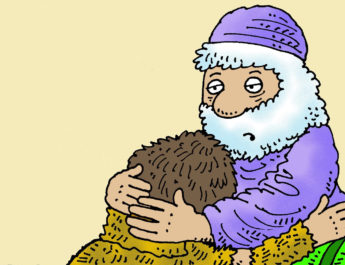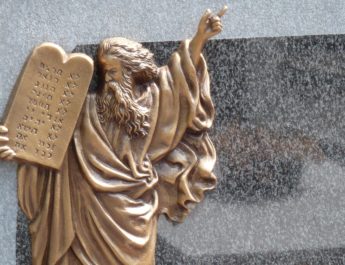2 Samuel 18:5-9, 15, 31-33
Ordinary B37
5 The kingA orderedB JoabC and AbishaiD and Ittai,E
A “king” = melek. From malak (to be or become king or queen, to rise to the throne, to be crowned; by implication, to take counsel). This is king or royal.
B “ordered” = tsavah. This is to charge, command, order, appoint, or enjoin. This is the root that the Hebrew word for “commandment” comes from (mitsvah).
C “Joab” = Yoab. From YHVH (proper name of the God of Israel; God, Lord; the self-existent or eternal one); {from havah (to become) or hayah (to be, become, happen)}. + ab (father, ancestor, grandfather; father in a literal or figurative sense). This is Joab or Yoab, meaning “the Lord is father.”
D “Abishai” = Abishay. Related to “Joab” in v5. From ab (see note C above) + shay (a gift or present; something given as homage); {from shavah (to equalize, resemble, agree with, compare, adjust, compose, place, or yield)} OR from ab (see above) + Yishay (Jesse, a name; “my husband” or “the Lord exists”); {perhaps from ish (man); {perhaps from enosh (human, humankind, mortal); from anash (to be weak, sick, or frail)} OR from the same as yesh (being, existence, substance)}. This is Abishai or Abshai, a name meaning “my father is Jesse” or “father of a gift,” which may imply generosity. It could also mean “my father the Lord exists.” See https://www.abarim-publications.com/Meaning/Abishai.html & https://www.abarim-publications.com/Meaning/Jesse.html
E “Ittai” = Ittay. Related to “Joab” in v5. 9x in OT. From et (with, among, beside, concerning, near); {from anah (to meet, happen, approach)} OR perhaps et (see above) + Yah (the shortened form of the name of the God of Israel; God, Lord); {from YHVH (see note C above}}. This is Ithai or Ittai, a name which may mean, “companionable” or “near.” It could also mean “nearness of the Lord.” See https://www.abarim-publications.com/Meaning/Ittai.html
saying, “Deal gentlyF for my sake with the young manG Absalom.”H
F “gently” = at. 7x in OT. This is softly or gently. It can also refer to a charmer because their spells are whispered.
G “young man” = naar. May be from na’ar (to shake, toss up and down, tumble around). This is a child or a servant. It is a child in their active years so they could be aged anywhere from infancy to adolescence.
H “Absalom” = Abishalom. Related to “Joab” and “Abishai” in v5. From ab (see note C above) + shalom (completeness, soundness, welfare, favor, friend, good health; to be safe and figuratively well, happy, at peace, friendly; abstractly, includes the ideas of welfare and prosperity – not in excessive wealth, but in having enough); {from shalam (to be complete or sound; to have safety mentally, physically, or extending to one’s estate; so, if these things are safe and complete, the implication is that one would be friendly; and, if being friendly, one would make amends and that friendship would be reciprocated)}. This is Absalom or Abishalom, which means “my father is peace” or “father of peace” or “friendly.”
And all the peopleI heardJ when the king gave orders to all the commandersK concerningL Absalom.
I “people” = am. From amam (to darken, hide, associate; creating shadows by huddling together). This is people or nation. It can be used specifically for a tribe, collectively of troops or armies, or figuratively to refer to a flock of animals.
J “heard” = shama. This is to hear, call, consent, or consider. It implies listening intelligently, giving attention, and, because of these two factors, obedience and action are often implied.
K “commanders” = sar. This is chief, leader, ruler, lord, official, governor, prince, military leader. It refers to someone at the top of a rank or class.
L {untranslated} = dabar. From dabar (to speak, declare, discuss). This is speech, a word, a matter, an affair, charge, command, message, promise, purpose, report, request. It is a word, which implies things that are spoken of in a wide sense.
6 So the armyM went outN into the fieldO againstP Israel;Q
M “army” = am. Same as “people” in v5. See note I above.
N “went out” = yatsa. This is to go or come out, bring forth, appear. It is to go out in a literal or figurative sense.
O “field” = sadeh. This is literally field, ground, soil, or land. It can be used to mean wild like a wild animal.
P “against” = qirah. From the same as qara (to happen, meet, bring about). This is any kind of encounter, whether peaceful, hostile, or incidental. It can also mean help or seek.
Q “Israel” = Yisrael. From sarah (to persist, exert oneself, contend, persevere, wrestle, prevail) + el (God or god). This is Israel, meaning God strives or one who strives with God; new name for Jacob and for his offspring. This refers to the people and to the land.
and the battleR wasS fought in the forestT of Ephraim.U
R “battle” = milchamah. From lacham (to eat or feed on; figuratively, to battle as a kind of consumption/destruction). This is battle, war, fighting, or one who fights (i.e. a warrior).
S “was” = hayah. Related to “Joab” in v5. See note C above.
T “forest” = ya’ar. This is honeycomb, forest, thicket. Root may mean thick with green growth. It is a forest as a place where one would find honeycomb.
U “Ephraim” = Ephrayim. From the same as epher (ashes or dust – properly something strewn) OR from parah (to grow, increase, be fruitful in a literal or figurative sense). This is Ephraim, one of Joseph’s sons, his descendants, and their land.
7 The menV of Israel were defeatedW there byX the servantsY of David,Z
V “men” = am. Same as “people” in v5. See note I above.
W “defeated” = nagaph. This is to strike, beat, hurt, stumble, defeat, inflict disease.
X “by” = paneh. From panah (to turn, face, appear). This is face in a literal or figurative sense. It could be face, presence, anger, respect. It can also be used of God to indicate divine favor or presence.
Y “servants” = ebed. From abad (to work, serve, compel; any kind of work; used causatively, can mean to enslave or keep in bondage). This is a servant, slave, or bondservant.
Z “David” = David. From the same as dod (beloved, love, uncle); the root may mean to boil, which is used figuratively to describe love. So, this implies someone you love such as a friend, a lover, or a close family member like an uncle. David’s name likely means something like “beloved one.”
and the slaughterAA there was greatBB on that day,CC twentyDD thousandEE men.
AA “slaughter” = maggephah. Related to “defeated” in v7. From nagaph (see note W above). This is a blow or slaughter. So, it could be a defeat or plague.
BB “great” = gadol. From gadal (to grow up, become great, become wealthy – to advance. The root meaning may be to twist in the sense of the process of growing). This is great, high, bigger, noble, old, marvelous. It can also refer to someone who is powerful or distinguished.
CC “day” = yom. Root may mean being hot. This is the day in a literal or figurative sense. It can also mean birth, age, daylight, continually or other references to time.
DD “twenty” = esrim. From the same as eser (ten, tenth). This is twenty or twentieth.
EE “thousand” = eleph. Perhaps from the same as eleph (herd, cattle); from alaph (to learn, speak, associate with). This is thousand.
8 FFThe battle spreadGG over the faceHH of all the country;II
and the forest claimedJJ moreKK victimsLL that day thanMM the sword.NN
JJ “claimed” = akal. This is to eat, devour, burn up, or otherwise consume. It can be eating in a literal or figurative sense.
KK “more” = rabah. This is increasing in any aspect whether quantity, authority, size, quality, greatness, etc.
LL “victims” = am. Same as “people” in v5. See note I above.
MM {untranslated} = akal. Same as “claimed” in v8. See note JJ above.
NN “sword” = chereb. From charab (to attack, slay). This is any sharp instrument like a sword, dagger, axe, or mattock.
9 Absalom happened to meetOO, PP the servants of David. Absalom was ridingQQ on his mule,RR
OO “happened to meet” = qara. Related to “against” in v6. See note P above.
PP {untranslated} = paneh. Same as “by” in v7. See note X above.
QQ “riding” = rekeb. From rakab (to ride an animal or in some vehicle; also, bringing on a horse). This is a vehicle, wagon, or chariot. It can be cavalry or an individual rider.
RR “mule” = pered. 14x in OT. Perhaps from parad (to divide, break through, scatter, sever, stretch, to spread oneself, or to be out of joint). This is a mule – perhaps as a lonely creature.
and the mule wentSS under the thick branchesTT of a great oak.UU
SS “went” = bo. This is to enter, come in, advance, fulfill, bring offerings, enter to worship, attack. It can also have a sexual connotation.
TT “thick branches” = sobek. 1x in OT. Perhaps from sebok (thicket or copse); from sabak (to tangle, entwine). This is thick branches or a thicket.
UU “oak” = elah. 13x in OT. From ayil (terebinth, oak); from the same as ulam (porch, hall); from the same as ul (mighty, strength, body, belly; root may mean to twist and that implies strength and power). This is an oak or terebinth. It could some other kind of tree that is strong.
His headVV caught fastWW in the oak, and he was left hangingXX between heavenYY and earth,ZZ while the mule that was under him went on.AAA
VV “head” = rosh. This may come a word that means to shake. It is the head, captain, or chief. It can also be excellent or the forefront. It can be first in position or in statue or in time (i.e. the beginning).
WW “caught fast” = chazaq. This is to strengthen, seize, be courageous, repair, bind, heal, conquer, harden.
XX “left hanging” = natan. This is to give, put, set, offer. It is to give literally or figuratively.
YY “heaven” = shamayim. Root may mean being lofty. This is sky, the air, or heaven. It is in a dual noun form so this might refer to the part of the sky where the clouds move on the one hand and the part beyond that where the sun, moon, and stars are on the other hand.
ZZ “earth” = erets. Same as “country” in v8. See note II above.
AAA “went on” = abar. This is to pass over or cross over. It is used for transitions, whether literal or figurative. It can also mean to escape, alienate, or fail. This is the root verb from which “Hebrew” is drawn.
15 And tenBBB young men, Joab’s armor-bearers,CCC surroundedDDD Absalom and struckEEE him, and killedFFF him.
BBB “ten” = eser. Related to “twenty” in v7. See note DD above.
CCC “armor-bearers” = nasa + keli. Nasa is to lift in a broad sense, literally and figuratively. So it could be to carry, take, or arise. It could also be bring forth, advance, accept. Keli is from kalah (to end, be finished, complete, prepare, consume, spent, or completely destroyed). This is something that was prepared – any implement, utensil, article, vessel, weapon, or instrument. Also includes jewels, weapons, bags, carriages, and furniture.
DDD “surrounded” = sabab. This is turning around, going around; to surround, cast, walk, fetch. It is to revolve or border in a literal or figurative sense.
EEE “struck” = nakah. This is to hit whether lightly or severely. It can be used in a literal or figurative sense. So, this could be beat, punish, give wounds, kill, or slaughter.
FFF “killed” = mut. This is to die in a literal or figurative sense. It can also refer to being a dead body.
31 ThenGGG the CushiteHHH came; and the Cushite said, “Good tidingsIII for my lordJJJ the king!
GGG “then” = hinneh. From hen (lo! Behold! If, though; an expression of surprise). This is to draw attention, show suddenness or surprise, or to emphasize the importance of the coming statement. See! Lo! Behold!
HHH “Cushite” = Kushi. From Kush (Cush or his descendants; Ethiopia – a place south of the Nile Valley); perhaps from Egyptia k’sh (Cush). This is Cushite or Ethiopian. See https://en.wiktionary.org/wiki/%D7%9B%D7%95%D7%A9#Hebrew
III “good tidings” = basar. This is being a messenger, to publish, carry, or preach. Properly, this is being fresh, rosy or cheerful as one bearing news.
JJJ “lord” = adon. From a root that means ruling or being sovereign. This is lord, master, or owner.
For the LordKKK has vindicatedLLL you this day, delivering you from the powerMMM of all who rose upNNN against you.”
KKK “Lord” = YHVH. Related to “Joab” and “Ittai” in v5 & “was” in v6. See note C above.
LLL “vindicated” = shaphat. This is to judge, defend, pronounce judgment, condemn, or govern. It can refer to God judging or to human judges. This is pronouncing a verdict in favor or against so it implies consequences or punishment. It can also mean to litigate or govern as one with authority.
MMM “power” = yad. This is hand, ability, power. Hand in a literal sense, but also what one can do or the means by which one does it.
NNN “rose up” = qum. To arise, stand, accomplish, establish, abide. This is rising as in rising against, getting up after being sick or asleep, arising from one state to another, becoming powerful, or rising for action. It can also be standing in a figurative sense.
32 The king said to the Cushite, “Is it wellOOO with the young man Absalom?”
The Cushite answered, “May the enemiesPPP of my lord the king, and all who rise up to do you harm,QQQ be like that young man.”
OOO “well” = shalom. Related to “Absalom” in v5. See note H above.
PPP “enemies” = oyeb. From ayab (to hate or be hostile to). This is a foe or enemy as one that you are hostile to.
QQQ “do…harm” = ra’. From ra’a’ (to be evil, bad, afflict; properly, to spoil – to destroy by breaking into pieces; figuratively, to cause something to be worthless; this is bad in a physical, social, or moral sense; that which displeases, to do harm or mischief, to punish or vex). This is bad, disagreeable, that which causes pain, misery, something having little or no value, something that is ethically bad, wicked, injury, calamity. This refers to anything that is not what it ought to be – a natural disaster, a disfigurement, an injury, a sin.
33 The king was deeply moved,RRR and went upSSS to the chamber overTTT the gate,UUU and wept;VVV and as he went,WWW
RRR “was deeply moved” = ragaz. This is shaking from any strong emotion, particularly anger or fear. It can be agitated, excited, perturbed, afraid, quaking, quivering.
SSS “went up” = alah. This is to go up, approach, ascend, be high, be a priority; to arise in a literal or figurative sense.
TTT “chamber over” = aliyyah. Related to “went up” in v33. 19x in OT. From alah (see note SSS above). This is a lofty place. So, it could be stairs, an upstairs room, or a chamber on the roof. It could also be an ascent or the sky.
UUU “gate” = shaar. May be related to sha’ar (to calculate or reckon; may come from a root that means to open up or split). This is a gate, door, or other opening like a port.
VVV “wept” = bakah. This is to weep, complain, or lament.
WWW “went” = halak. This is go, come, walk. It is walk literally and figuratively and includes people and animals. It can be used figuratively for one’s moral life – how we walk according to God’s way or against it. It can also refer to the walk of life as in the course one’s life takes, the choices we make, etc.
he said, “O my sonXXX Absalom, my son, my son Absalom! WouldYYY I had diedZZZ instead of you, O Absalom, my son, my son!”
Image credit: “Absalom” by Albert Weisgerber, 1912.




